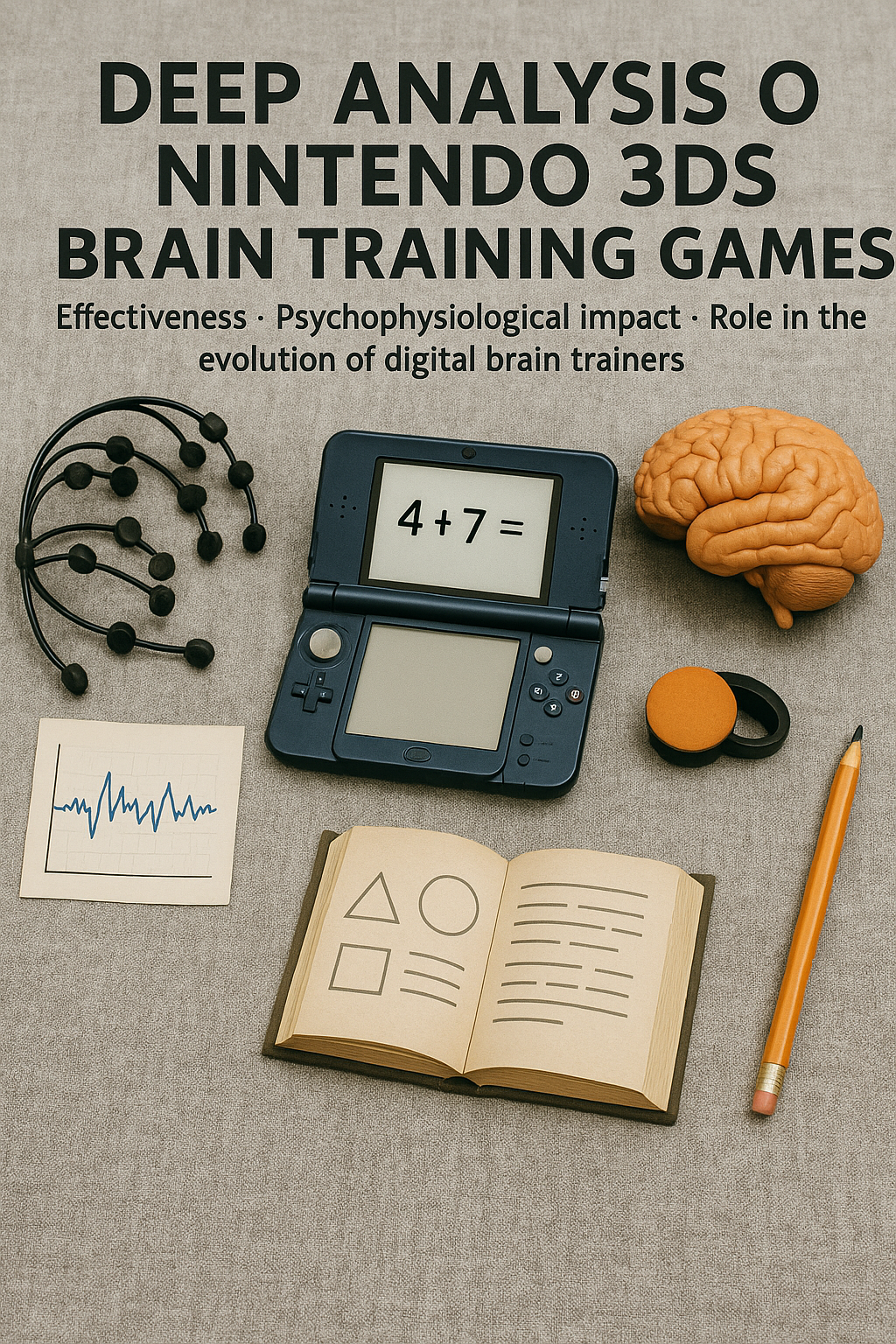The world may have moved on from handhelds — but brain training 3DS games still hold serious cognitive power.
Long before mobile apps gamified attention, the Nintendo 3DS was already delivering immersive mental workouts. The era of brain training 3ds titles wasn’t just about entertainment — it was about transforming gameplay into measurable cognitive development. Today, these games still offer valuable insight into how structured, repeatable challenges enhance memory, attention, and reasoning.

The Legacy of Brain Training on the Nintendo 3DS
When Dr. Kawashima’s Brain Training arrived on the 3DS, it wasn’t just another game — it was a cultural phenomenon. Based on neuroscience research, the game encouraged players to engage in rapid mental exercises: math speed tests, memory puzzles, reaction time drills. It gamified daily mental effort. Unlike passive apps, the 3DS offered physical interaction with stylus-based challenges that stimulated multiple neural circuits.
Players tracked progress, competed with friends, and built routines. The brain training 3ds era signaled the start of intentional, casual cognitive development. And it stuck — users formed habits that extended beyond the device. Even today, many enthusiasts credit their improved mental agility to consistent play with these titles. It was one of the first examples of tech-fueled neuroplasticity that didn’t feel clinical or sterile — just smart fun.
What Made Brain Training 3DS Games Effective
Unlike many modern “brain games,” 3DS titles focused on cognitive fundamentals: working memory, visual-spatial reasoning, and inhibitory control. These aren’t just abstract skills — they’re the foundation for decision-making, learning, and productivity. The best brain training 3ds experiences delivered challenge without overwhelm. Exercises adapted to player ability. Feedback was instant.
Daily repetition built neural pathways. Combined with the 3DS’s tactile interface, this created a feedback loop of focus and reward. The result? Players stayed engaged longer — not because of push notifications, but because their minds were being stretched. That balance of simplicity, structure, and neuroscience is what still sets these games apart. They weren’t gamification for its own sake — they were tools built on real principles of cognitive science.
Modern Apps vs Brain Training 3DS: A Cognitive Comparison
Today’s mental training apps boast rich visuals and endless customization. But in a head-to-head test, many fall short in sustained impact. Why? Shallow repetition, passive design, and dopamine-chasing UX dilute the depth. In contrast, brain training 3ds titles emphasized active recall, time pressure, and goal tracking. Players knew exactly what they were improving.
Case in point: “Devilish Brain Training” introduced split-attention drills and verbal fluency tasks that mirrored real-world multitasking demands. These aren’t common in modern apps. The biggest difference? Focus. While apps compete with notifications, 3DS games existed in a closed, immersive loop. That undivided attention is critical for neuroplastic adaptation — and often missing in today’s open-tab reality.
Why Brain Training 3DS Still Resonates Today
Despite advances in digital health, many users still return to 3DS titles for a reason: they work. In a world flooded with new productivity trends, the core value of consistent, structured brainwork remains unchanged. Brain training 3ds titles provide exactly that — without the fluff. They don’t promise IQ jumps or superpowers. Instead, they build routines that support clarity, speed, and resilience. The nostalgia helps, sure. But behind it lies a powerful truth: when mental stimulation is gamified properly, it sticks. It becomes part of lifestyle, not a fleeting biohack. Even for newer audiences unfamiliar with the 3DS, these games are worth exploring — not for retro vibes, but for results.
How the Brain Benefits from Structured Digital Training
Neuroscience confirms it: targeted mental exercise increases cortical thickness, improves synaptic efficiency, and strengthens attention control. But not all exercises are equal. Structured tools like the brain training 3ds series focus on executive function — the same skills we need to resist distraction, plan projects, and solve complex problems. Unlike passive screen time, intentional challenges like mental math under time pressure or dual-task memory drills increase working memory bandwidth. According to this Frontiers in Psychology study, even short sessions can lead to meaningful improvement when repeated daily. That’s what these games delivered — and what many modern tools still struggle to replicate.
Integrating Brain Training 3DS Into Modern Focus Routines
Can a retro console support modern focus habits? Absolutely. Whether you’re building a morning routine, taking midday breaks, or unwinding before sleep — a short session with your favorite brain training 3ds title can become a mental anchor. It’s not about nostalgia. It’s about creating consistent touchpoints of cognitive activation. Pair your 3DS with a focus timer or digital habit tracker. Use it as an intentional intermission — a 15-minute break that actually sharpens your brain. For digital minimalists, this kind of low-distraction interface is gold. No badges, no pings. Just direct input and result. Explore other neuroplasticity tools here that complement the 3DS experience.
Where Brain Training 3DS Fits in the Future of Mental Fitness
While AI-based tools and immersive neurotech platforms are growing, the simple effectiveness of brain training 3ds should not be overlooked. It reminds us that great mental tools don’t need to be complex — just consistent. These games built a framework: quick, structured, personalized challenges that measure what matters. The future of cognitive development will likely blend old and new — AI with analog, retro with real-time feedback. But as long as mental performance matters, these titles will remain a gold standard. They’ve earned their place not only in gaming history, but in the toolkit of anyone serious about long-term focus and mental agility.
Final Thoughts
In a digital age obsessed with the new, brain training 3ds games remain proof that consistent, well-structured cognitive work still delivers. Whether you’re revisiting these titles or discovering them anew, their simplicity and precision offer timeless value. They may not be flashy, but they are focused — and in a world of distractions, that’s exactly what the brain needs.
Ready to Take Action?
Start applying these insights today — and discover what real focus feels like.
